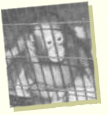 Statement
concerning the case of illegal
wildlife trade
Statement
concerning the case of illegal
wildlife trade
ALIVE News Monday,
15 November, 1999x
1. Preface
The illegal wildlife trade
involving Umeda Wan Wan Land
in Osaka has made a landmark
case in the history of criminal
investigation of illegal wildlife
trade in this country, resulting
in prosecution of all concerned.
The trial is pending now and
we ernestly hope that all that
are responsible will be punished
with the maximum penalty.
On the other hand, this case
has revealed that the systems
of the government of Japan
are not functioning regarding
deterrence of illegal importation
at the water's edge (the Customs),
restriction of illegal trade
within the country (Environment
Agency), disposal of confiscated
live animals/plants (Ministry
of International Trade and
Industry, Environment Agency).
This indicates that there
exist serious problems for
implementing CITES provisions.
We, the undersigned, submit
recommendations to the competent
authorities as per attached.
2. Regarding the provision
of "Law for the Conservation
of Endagered Species of Wild
Fauna and Flora"("LCES")
on ordering the return of
confiscated live animals/plants
to the country of origin
not being applied to this
case .
It was of great concern whether
this case would become the
first case to which the provision
on ordering the return of confiscated
live animals to the country
of origin under "LCES" has
been applied, but it did not.
The Environment Agency claims,
in answer to our questioning,
that the guilty party has already
volunteered to bear the cost
of returning the confiscated
live animals to the country
of origin and it is deemed
unnecessary to apply the provision
to this case. But this claim
does not hold.
The signification of the provision
of ordering the return of confiscated
live animals/plants to the
country of origin is not merely
in order that the guilty party
should be placed responsible
for bearing the cost for the
return of confiscated live
animals/plants. The foremost
implication of this provision
is that the government concerned
should be the one that is ultimately
responsible for decision-making
as to the disposal of confiscated
live animals/plants and risk
involved in doing so.
For example, should confiscated
live animals spend the rest
of their lives in a deteriorated
care facility with no hope
of being released to the wild
as the result of improper selection
of such a facility on the government
side or die while in transit
because of inappropriate handling,
the government concerned would
be held responsible for the
outcome. This provision was
enacted for the purpose of
urging the government of importing
country to become aware of
its resposibility for enforcing
CITES provisions in an effective
manner and to willingly perform
its duty.
The government of Japan has
already tranferred the legal
ownership of the confiscated
live animals to the government
of Indonesia while they are
still in Oji Zoo. Thus, the
Indonesian consulate general,
on behalf of the government
of Indonesia, became the exporter
and the government of Indonesia
importer.
The only further involvement
of the government of Japan
is to issue a reexport permit
and will not be responsible
for anything else. It is hard
not to come to a conclusion
that the government did not
apply the provision of "LCES" so
as to be able to evade the
responsiblity.
That is also deemed to be
the very reason why the provision
on ordering the return confiscated
live animals/plants has never
been applied to any of past
cases after "LCES" was
enacted more than 6 years ago.
If we continue to let the
executive body of the government
deal with this issue in this
manner, the provision on ordering
the return of confiscated live
animals/plants will prove nothing
but a dead letter and this
will give adverse effects on
effective implementation of
CITES provisions. We will keep
urging the government of Japan/Environmental
Agency to establish methods
for enabling the provisions
of "LCES" applicable
in an appropriate manner.
3. Regarding the confiscated
live animals that have been
returned to the government
of Indonesia
For the illegally imported
animals that have been returned
to the country of or igin,
we plan to monitor the way
the animals are cared for in
the rehabilitation facility.
We are especially concerned
about the way the designated
facility for orangutans operates;
while this facility has programs
for releasing orangutans to
the wild, the monitoring data
after releasing them to the
wild from the facility has
not been made available. And
there are other unknown factors
that we would like to look
into.
Also, we plan to coordinate
our efforts with experts and
work to improve programs for
releasing illegally captured/traded/confiscated
animals to the wild as well
as being involved with the
issue of conservation of habitat
for wildlife in Indonesia.
The Japan Indonesia Orangutan
Protection and Investigation
Committee
5-11-8 Ikuta Tama-ku
Kawasaki 214-0038
Tel & Fax (044) 955 7406
Akira Suzuki
Chairman
The Japan Wildlife Conservation
Society (JWCS)
2-5-4-7F Toranomon Minato-ku
Tokyo 105-0001
Tel & Fax (03) 3595 1171
Masayuki Sakamoto
Secretary-General
All Life in A Viable Environment
(ALIVE)
1-17-16 #201 Honkomagome Bunkyo-ku
Tokyo 113-0021
Tel (03) 5978 6272, Fax (03) 5978 6273
Fusako Nogami
Director




![]()
 Statement
concerning the case of illegal
wildlife trade
Statement
concerning the case of illegal
wildlife trade